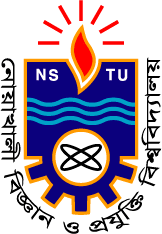Institutional Strategy for Interdisciplinary Research
Noakhali Science and Technology University (NSTU) encourages and facilitates
interdisciplinary research across diverse academic domains. Collaborative
initiatives among departments and institutes are actively promoted, especially
in areas where the integration of science, technology, health, environment,
and social sciences can generate impactful outcomes.
We support interdisciplinary research by enabling collaboration between
faculty members from various departments, offering access to shared laboratory
resources, and encouraging joint supervision of research projects. Internal
research funding mechanisms are also designed to accommodate and promote
proposals involving cross-disciplinary collaboration.
To assess success, we consider measurable outputs such as peer-reviewed
publications, citations, and contributions to national development goals.
Projects that demonstrate relevance to societal challenges—such as health,
environment, education, and technological innovation—are especially valued.
Annual internal reviews track the progress and outcomes of interdisciplinary
research, taking into account the extent of collaboration, publication
quality, and applied impact. These efforts align with our institutional vision
to promote research that transcends disciplinary boundaries and addresses
complex real-world problems.
NSTU hosts a wide range of departments and institutes across science,
technology, social sciences, business, humanities, and education—creating a
conducive environment for interdisciplinary synergy.
Facilities and Resources for Interdisciplinary Collaboration
Noakhali Science and Technology University (NSTU) is committed to fostering
interdisciplinary research through a blend of physical and digital
infrastructure that supports collaboration across various fields.
The university offers shared laboratories equipped with modern instruments for
life sciences, ICT, engineering, and environmental studies. These facilities
are available to faculty and students from different departments, enabling
joint research activities. Seminar rooms, meeting halls, and open
collaborative spaces are also available and equipped with audiovisual tools to
support both in-person and hybrid research meetings.
Beyond physical resources, NSTU enhances interdisciplinary collaboration
through digital access. The university provides remote access to research
databases via OpenAthens, enabling researchers to access scholarly journals,
eBooks, and academic databases from any location. Faculty and students also
benefit from the Turnitin Feedback Studio, which supports collaborative
writing and maintains academic integrity. These tools are essential for
research teams working across disciplines and distances.
Centralized computing facilities and departmental access to high-end research
equipment further support interdisciplinary projects. Additionally, the
university hosts regular workshops and research seminars in well-equipped
venues to promote academic networking and knowledge exchange.
By combining well-maintained physical infrastructure with robust digital
tools, NSTU creates an environment conducive to innovative interdisciplinary
research.
Administrative Support for Interdisciplinary Projects
Noakhali Science and Technology University ensures targeted administrative
support for interdisciplinary research through its institutional structures
and practical mechanisms. The Research Cell, led by a Director and supported
by several Assistant Directors, plays a central role in guiding researchers
through internal grant schemes, assisting in proposal preparation, managing
project budgets, and facilitating ethical clearance via the NSTU Ethical
Committee—especially for studies involving biological or clinical components.
While the Research Cell promotes research culture and capacity-building across
the university, access to laboratories or specialized equipment is managed
directly by the respective departments. Any interdisciplinary team needing
such access submits a formal request to the Chairman of the department that
owns the facility. The Chairman reviews the request, consults the usage
schedule, and grants permission based on availability and departmental policy.
This approach ensures that resource allocation is well-regulated while still
allowing interdisciplinary teams to work flexibly and collaboratively.
Administrative personnel also support faculty in preparing and submitting
research proposals to funding bodies such as the UGC, the Ministry of Science
and Technology, and international agencies. Once grants are awarded, the
Research Cell assists in monitoring milestones, tracking expenditures, and
compiling final reports, helping teams remain compliant with institutional and
funding requirements.
NSTU regularly conducts workshops and orientation sessions on
interdisciplinary research design, proposal development, and research ethics.
Communication support is provided through the Public Relations Office, which
helps disseminate research outcomes via press releases, web content, or
outreach to industry and external institutions.
By combining centralized guidance with decentralized resource access, NSTU’s
administrative ecosystem allows interdisciplinary research teams to
thrive—ensuring that support is not only policy-driven but also grounded in
operational reality.
Career Development and Recognition of Interdisciplinary Work
At NSTU, interdisciplinary research is treated on par with disciplinary
research within the existing promotion and tenure evaluation system. While
there are no additional or special incentives solely for engaging in
interdisciplinary work, such research is fully acknowledged as part of a
faculty member's scholarly contributions.
Faculty members are evaluated based on standard academic criteria, including
research output, journal publications, participation in funded projects, and
overall academic service. Interdisciplinary research—such as joint
publications, collaborative grants, and cross-departmental or institutional
projects—is recognized as valid and impactful scholarly output when meeting
quality and relevance benchmarks.
Rather than maintaining a separate track for interdisciplinary work, NSTU
integrates all research achievements into a unified evaluation process. This
inclusive model ensures that interdisciplinary contributions are valued
equally within the broader context of research productivity, allowing faculty
from diverse research backgrounds to progress without bias.
In short, NSTU fosters a fair and inclusive evaluation environment where
interdisciplinary research is respected and counted alongside other scholarly
achievements. This approach ensures that innovation and collaboration across
fields can thrive organically without structural barriers in career
progression.
